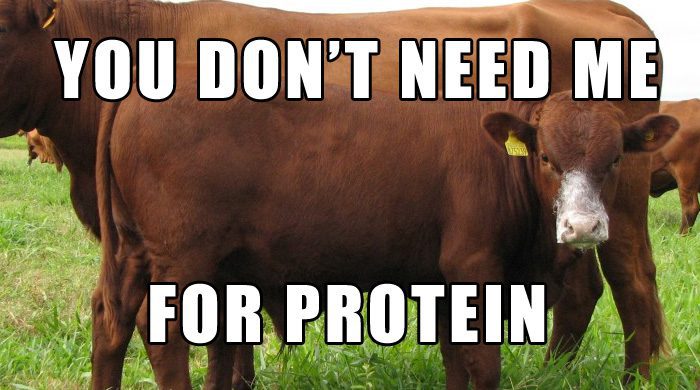Protein Combining Myth And Complete Plant Protein

The protein combining myth was carefully orchestrated and forwarded to support the sale of animal-based protein and products. The fascination with animal protein was spearheaded by a study done on rats in 1914.[1]
Infant rats fed animal protein grew faster than infant rats fed plant protein, which resulted in plant protein being labeled as inferior to animal protein for human consumption.
The research findings were biased in the favor of the consumption of animal protein, and led to plant protein being considered an “incomplete protein” because the infant rats that ate plant protein didn’t grown as fast.
Being labeled as an incomplete protein meant plant protein didn’t contain all of the 9 essential animo acids we need to consume because the body cannot synthesize them.
It was later proven scientifically that plant protein was a “complete protein” and the consumption of plant protein was better than the consumption of animal protein.
The consumption of plant protein regulated growth to support the healthy development of the body, while the consumption of animal protein supported the proliferation of cancer.
Even though the research’s conclusions that plant protein was an incomplete protein were proven to be false, campaigns put in place by the meat industry firmly solidified animal protein as the go-to protein.
The campaign was so successful that many people till this day don’t realize plants contain protein.
The meat industry was only interested in maintaining a strong association with animal protein and strength, health, and superior growth, and the fact that the consumption of animal protein was associated with increased rates of cancer and other chronic diseases didn’t matter.[2,3]
Protein Combining
The marketing of animal protein was put together so well that even proponents of a plant based diet and plant protein were negatively influenced about the quality of plant protein, which helped to reinforce the protein combining myth.
In 1971 Frances Moore Lappé published her best selling book, Diet for a Small Planet, which sold 2 million copies and wrote that it was necessary to combine different sources of plant protein in order to get enough protein.
The book became so influential it was was as a guide for the environmental movement that focused on conservation and green politics.
Lappé’s book put the nail in the coffin for vegetable protein, marking it as an inferior protein that needed to be combined to stand up to the quality of animal protein.
The problem is Lappé had to retract her statement because it wasn’t accurate and she had to release a revised edition of the book in 1981 where she wrote:
“In 1971 I stressed protein complementarity because I assumed that the only way to get enough protein … was to create a protein as usable by the body as animal protein. In combating the myth that meat is the only way to get high-quality protein, I reinforced another myth. I gave the impression that in order to get enough protein without meat, considerable care was needed in choosing foods. Actually, it is much easier than I thought.”
Simply eating a plant-based diet consisting of 2000 calories a day would supply the daily recommended value for protein.
Though the research had been around for decades that plant protein was a “complete protein,” vested interests in the meat industry were able to influence health organizations against supporting the data.
Proponents of a plant-based diet and plant-based protein like John McDougall, MD were able to keep the pressure on these health organizations.[4]
Organizations like The American Heart Association had to finally acknowledge that plant protein was a complete protein, and protein combining wasn’t necessary to achieve the daily recommended value for protein.
“Whole grains, legumes, vegetables, seeds and nuts all contain both essential and non-essential amino acids. You don’t need to consciously combine these foods (“complimentary proteins”) with a given meal.
Even though health organizations were pressured to support the truth, the damage had been done and the association of “meat and protein” had been etched in the public’s mind. Today you will easily find people who ask vegans and vegetarians, “Where do you get your protein?”
The reality is people who eat a plant-based diet can easily get their daily requirement for protein. This study[5] indicated that people who eat plant-based diets average around twice the requirements for protein.
Some plants food do contain more protein than others and eating a well-balanced diet consisting of fruits, vegetables, whole grains, legumes, nuts, and seeds will provide recommended amount of protein needed.
This variety of plant foods will also offer a wide range of nutrients and phytonutrients needed to support health and vitality.
Plant foods that are more concentrated in protein would be legumes, whole grains, nuts, and seeds, and are foods like chickpeas, spelt, kamut, tef, rye, fonio, quinoa, sesame seeds, and hemp seeds.
For more health supporting alkaline protein sources and alkaline foods please view the nutritional guide.
[1] T B Osborne, L B Mendel. Amino-acids in nutrition and growth. Abtlerhdden: Zeitschr. f. phvsiol. Chem., Ixxvii, p. 27, 1914.
[2] Animal Protein as a Carcinogen
[3] Animal Protein “Turns On” Cancer Genes
[4] J McDougall. Plant foods have a complete amino acid composition. Circulation. 2002 Jun 25;105(25):e197; author reply e197.
[5] N Rizzo, K Jaceldo-Siegl, J Sabate, G E Fraser. Nutrient Profiles of Vegetarian and Nonvegetarian Dietary Patterns. Journal of Academy of Nutrition and Dietetics. 2013 Dec;113(12):1610–1619.






